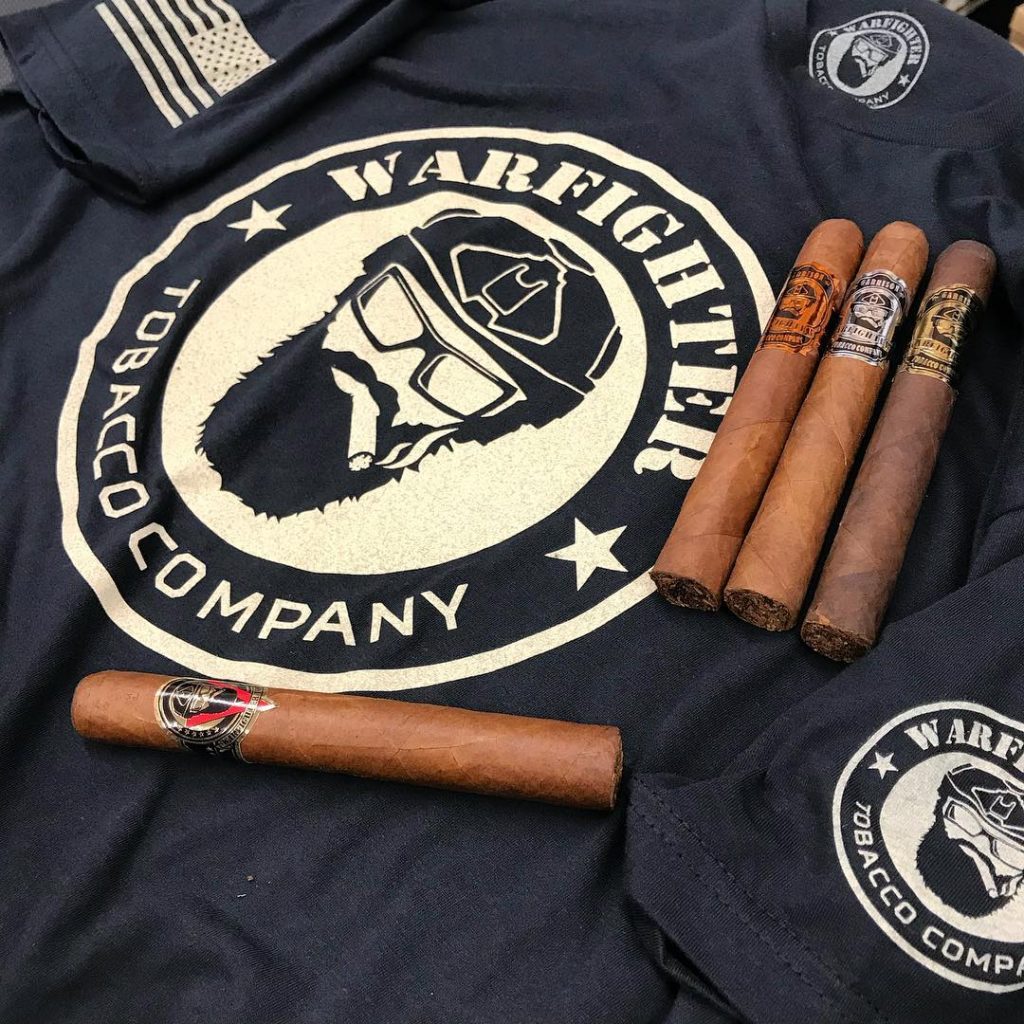Thunder Alley is proud to work directly with Warfighter Tobacco Company to provide the smoothest to the boldest cigars around! Formally located just down the road from us in Bennett, NE and now shipping out of Texas. Who doesn’t enjoy a great cigar after a great day on the range! (Oh and YES we do have a Tobacco License)
What is a Warfighter? We are Service Members, Veterans, Firefighters, Police Officers, First Responders and anyone who believes in selflessly protecting others from the cold, hard world. We are the Sheepdogs who protect the herd from the big bad wolf. We are a fraternity of men and women who are willing to lay it all down for an idea. For more information go to https://wfttobacco.myshopify.com
Warfighting is tough work and throughout history, at the end of the mission, when one of our members goes down, or it is time to celebrate victory, the warfighter has done so with a cigar in hand. It is in that spirit that Warfighter Tobacco Company was born.
Warfighter tobacco is only available at Thunder Alley, not online so come in and pick our your next cigar with us knowing you are getting the best smoke around!
Types of Cigars we stock her at Thunder Alley will vary depending on what is available at the time. Usually we will have in stock Toro, Double Corona and Robusto but may surprise you with some Rocco’s too. Blends will range from Field to Garrison but others may come at any time. Enjoy the article below on Cigars Basic Training.
Cigar Basic Training
“The Wrapper”
The outside layer is called the “wrapper” and is usually how the cigar is referenced. For example, Connecticut, Sumatra and Maduro all describe the wrapper and usually, but not always, refers to the type of tobacco that is used in the wrapper. Connecticut wrappers describe a cigar that is made from Connecticut tobacco seed (but can be grown almost anywhere). The exception to this rule is the Maduro. Maduro is not a type of tobacco, but instead refers to the color. Maduro means “ripe” and when tobacco leaves are harvested later, they become dark. Maduro wrappers are the darkest shade varying from dark brown to almost black. Various tobaccos can be used to grow Maduro wrappers, and some growers also use the term “Maduro” to identify the process they use to ferment the dark leaf. The bottom line is that while it is often said a Maduro will be a bolder smoke, it is not always the case. Our Maduro is our boldest smoke, but still not as bold as some truly seasoned smokers prefer. Because the Wrapper is what you see, it should be a perfect leaf without tears, holes or other cosmetic imperfections.
“The Binder”
The binder is the second layer of tobacco. It can be any variety of tobacco and expert blenders will mix and match binders to achieve the experience they want the cigar to have. The binder is critical because it holds and shapes the long filler tobacco that is the heart of the cigar. Because the binder is not visible, it doesn’t have to be as cosmetically perfect as the wrapper, and some wrappers that are damaged may become binders. Because of its function, however, the binder must be free from any significant defects that would compromise the integrity of the cigar and a binder leaf will be harvested for its elasticity that makes the rolling process easier.
“The Filler”
The filler in premium cigars is usually referred to as “long filler” because it is generally whole leaves of tobacco that are bundled together in the center of the cigar. The expert blenders will mix and match filler tobacco varieties to again, achieve the correct experience and flavor of the cigar. Filler tobacco is the largest portion of the cigar and, therefore is critical to the blend. Because filler tobacco is meant to be tasted and not seen, it can have all variety of imperfection that would never make the grade regarding the quality of the binder or wrapper. In addition to the types of tobacco that is used, every cigar will use a blend of the three types of leaves found on a tobacco plant. The top leaves are known as Ligero and will be the darkest and most flavorful (strongest). The middle leaves on a tobacco plant are known as Seco and are light and mild. These leaves get less direct sunlight than the Ligero which accounts for its different flavor. The bottom leaves are the Velado and do very little with regard to flavor. They are, however, hugely important because they are what makes a cigar burn properly. Because the Ligero and Seco leaves are more sundrenched, they burn quickly. The Velado prevents the cigar from burning improperly and gives the cigar its trademark “slow burn.”
“The Cap”
The cap is the “smoking” end of the cigar and is a piece of wrapper that is expertly crafted to finish smoking end and keep the cigar together. If you look closely at the cigar (and you should) you can see how the cap fits over the end of the cigar like a watch cap. This is critical because when you cut the cigar, you want to cut below the end of the cap. If you cut the cap off, your cigar is likely to unravel and will impact your smoking experience, if not ruin the cigar.
The Cut
There are several types of cigar cutters. Like a knife or firearm, having the right tool for the right job is critical (we know, everything is a hammer, although a cigar is more like the MRE spoon. Sure, you can use it to kill Taliban, but it is much more enjoyable to use it for its intended purpose. On second thought, killing Taliban with an MRE spoon is way better than eating an MRE with it–never mind). Although relatively simple in theory, the cut is the second thing you have control over (the first being storage; as in temperature and humidity) in determining whether you enjoy a good smoke or would have been better off chopping it up, sticking it in your lip and pretending it was “chaw.” Or better yet, shoving it down the throat of some Isis wacko to choke on before you kill him with an MRE spoon. Sorry, I digress….
When cutting a cigar, it is critical you cut below the cap (see our section on the parts of the cigar) so the cigar doesn’t unroll in the smoking process. Also, a cigar must be cut cleanly. That is, if you go all Jason Voorhees on it you will end up with torn leaves and bits of cigar in your mouth that are not only annoying, but really sexy when you are trying to spit them out. Cigars are cool, you are cool, so don’t screw this up.
Types of Cutters
So what is the proper cutter for you? There are preferences and then there are needs. Before discussing, let me explain the types of cutters you are most likely to encounter:
The Guillotine Cutter
This probably the most common cutter. It will have one, usually two, and rarely more razor blades that slice through the cap of the cigar. A guillotine work for every cigar. Guillotine cutters, however, are like firearms. With a firearm, you don’t wuss up and ride the bolt forward, everything will be fine. If you do, that bitch is gonna jam! Rack that slide back and let it go. Your mommy and daddy isn’t going to yell at you for slamming the car door—cause it is designed to be slammed! It is the same way with the Guillotine Cutter. Fast, even pressure is what it takes. If you try to go slow you are going to tear the leaves and have fun picking those out of your teeth! So not cool.
The Punch
Some prefer a punch over a guillotine cutter because it is a tad more forgiving than a weak cut or dull blades. With the punch, you don’t actually punch the end of the cigar; instead you apply even pressure and twist the blade of the punch into the end of the cigar. Usually when you pull out (hehe) you bring a small core of tobacco with you and you have a nice whole in the cap. If the cigars is drawing tight, you can bite down gently and widen the whole. Bite down too hard and, well, since I already went there with the sexual reference—you get the point….The advantage to the punch is that you can’t cut the cap off and ruin the cigar. The disadvantage is that some cigars, like a Torpedo or Pyramid, don’t work with a punch.
The V Cutter
This is what happens when you leave a guillotine cutter and a punch alone in your humidor. The V cutter combines the advantages of the guillotine and punch. It operates like a guillotine cutter but has a v-notch blade that cuts a “cat eye” into the cap of the cigar. What’s nice about the v-cutter is that the way it works it makes it nearly impossible to cut the cap off, thus making it more likely that you will get a good cut. Also, the cut is larger than a punch so it can draw better. Like the punch, however, some cigar shapes don’t work with it.
The Cigar Scissor
The enemy of any cigar is a dull cutter. There are many “disposable” cutters out there that are really only meant for a dozen or so uses and then they are no good. You can tell when a cutter is nearing the end of its life when you start tearing leaf (while using proper technique). The advantage of the cigar scissor is that they can be user sharpened. A quality cigar scissor will last a lifetime. And like the guillotine cutter, they work well for impromptu “enhanced interrogation” when you have that hi-value target who is being stingy with information you really would like to have. The down size is they are bulky and not as easy to carry in your pocket. When dull, they will tear and crush a cigar, which will leave you cursing. So, be sure to sharpen after every interrogation.
Needs vs. Preference
If you are starting off, everyone should have a good guillotine cutter, if only because they work for every type of cigar. Many prefer a v-cutter or a punch, but you are likely to find that you are offered and an awesome Pyramid or Torpedo and then have to bum a cutter because all you have is a punch. Your friends and enemies will mock you mercilessly. If you are a seasoned cigar smoking ninja, then you probably have several and that’s cool too. Like guns, one is good, two is better, and an armory is ideal!
The Others
There are a few types of niche cutters out there that I don’t discuss because we aren’t carrying them. Not everything can be Warfighter kit. We are always looking for what’s good, durable and of a decent value, so if you want us to check something out, we are always willing to do so.



